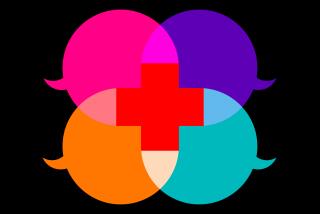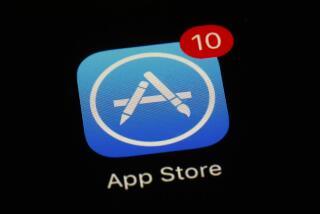Not all the apps you buy are yours to keep
- Share via
The apps on your smartphone or tablet are all bought and paid for, right? They may be paid for, but it doesn’t necessarily mean you own them.
Last week, iOS fans of Electronic Arts game Rock Band got a little shock when a warning popped up on their screens that the music would stop May 31. “Dear Rockers, On May 31, ROCK BAND will no longer be playable on your device. Thanks for rocking out with us!”
The message said the game wasn’t going to be updated due to the upcoming shutdown. That caused a wave of angry fists shaking in the direction of EA. (This kind of thing would have caused a riot at the door if it were a real concert.)
And EA has since issued a statement saying the warning was an error saying, “Rock Band for iOS will remain live – the in-app message users received yesterday was sent in error.” And a new on-screen message popped up: “A special note: Rock Band will remain playable on your device. Please disregard the previous notification regarding availability. We’re sorry for the confusion.”
While Rock Band for iOS seems to have gotten a bit of a reprieve, the warning highlights something for many of us who buy apps without blinking. Some apps come with special terms of service -- licensing agreements.
Really, the company did advise buyers at the time of purchase that they were only, essentially, leasing the title. Next to the links for EA’s website and the game’s support site is a link that reads “Application License Agreement.” There it spells out in legalese that you don’t really own that app you’re paying to download.
In our exuberance to feed our need for immediate gratification and quickly just click and go, we often overlook that there may be something for us to read before buying.
It’s not true of every offering in Apple’s App Store, but the big-name games seem to. Grand Theft Auto, Guitar Hero, the Sims, Draw Something and Words With Friends all do, for example. (Just assume that you should read before you buy games from Zynga and Electronic Arts.)
Other titles from the functional, like Evernote, to the addictive, like Angry Birds in Space, do not include any additional terms.
These terms are also visible on your iPhone in the App Store. But they’re way down at the bottom. Unless you scroll down all the way to the bottom, you’d likely miss it. It appears below the ratings and just above app support. And, on top of it, you’d actually have to tap something that reads “Legal.”
The reality is, on your iPhone, you’re never going to read that license, which you probably would have overlooked anyway. You’ve tapped the $4.99 button at the top, downloaded it and moved on to playing it without knowing there were special terms.
The way the license appears on the phone, it’s almost intentionally obscured. It’s easier to find out what other elements you can buy from EA that you wouldn’t really own.
As with most things these days, it’s buyer be aware, not just beware.
RELATED
Kindle Fire gets Draw Something app
Who owns your stuff in the Google Drive cloud?
Does the 1st Amendment cover clicking ‘like’ on Facebook?
Follow Michelle Maltais on Google+, Facebook or Twitter
Not all the apps you buy are yours to keep
More to Read
Inside the business of entertainment
The Wide Shot brings you news, analysis and insights on everything from streaming wars to production — and what it all means for the future.
You may occasionally receive promotional content from the Los Angeles Times.











